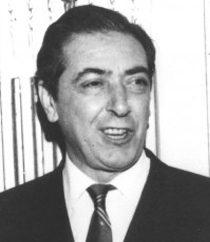
Norman Dello Joio
Bio:The distinguished musical career of Norman Dello Joio (1913-2008) began for him at age fourteen when he became a church organist and choir director of the Star of the Sea Church on City Island, New York. A descendant of Italian church organists, he was born January 24, 1913 in New York. His father was an organist, pianist, singer, and vocal coach. Dello Joio recalls that his father was working with singers from the Metropolitan Opera who used to arrive in their Rolls Royce’s, and that his childhood was surrounded with musicians and music in the home. Dello Joio’s father taught him the piano at age four, and in his teens he began studying organ with his godfather, Pietro Yon, organist at Saint Patrick’s Cathedral. In 1939, he was accepted as a scholarship student at the Juilliard School, and studied composition with Bernard Wagenaar. As a graduate student at Juilliard, he was organist at St. Anne’s Church in New York, and arrived at the conclusion that he did not want to spend his life in a church choir loft, as composition began to envelop all of his interest. In 1941, he began studies with Paul Hindemith, the man who profoundly influenced his compositional style, at Tanglewood and Yale. It was Hindemith who told Dello Joio, “Your music is lyrical by nature, don’t ever forget that.” Dello Joio states that, although he did not completely understand at the time, he now knows what he meant: “Don’t sacrifice necessarily to a system, go to yourself, what you hear. If it’s valid, and it’s good, put it down in your mind. Don’t say I have to do this because the system tells me to. No, that’s a mistake.” In the latter part of the forties, Dello Joio was considered one of America’s leading composers, and by the fifties had gained international recognition. He received numerous awards and grants including the Elizabeth Sprague Coolidge Award, the Town Hall Composition Award, two Guggenheim Fellowships, and a grant from the American Academy of Arts and Letters. He won the New York Music Critics’ Circle Award in 1948, and again in 1962. He won the Pulitzer Prize in 1957 forMeditations on Ecclesiastes for string orchestra, and an Emmy Award for his music in the television special Scenes from the Louvre. In 1958, CBS featured him in a one-hour television special, “Profile of a Composer.” A prolific composer, the partial list of Dello Joio’s compositions include over forty-five choral works, close to thirty works for orchestra and ten for band, approximately twenty-five pieces for solo voice, twenty chamber works, concertos for piano, flute, harp, a Concertante for Clarinet, and a Concertino for Harmonica. His stage works include three operas (one written for television and revised for the stage,) and eight ballets. Additionally, he has written nine television scores and three compositions for organ. His published solo piano works include three sonatas, two nocturnes, two preludes, two suites, two “Songs Without Words”, a Capriccio, Introduction and Fantasies on a Chorale Tune, Diversions, Short Intervallic Etudes, and Concert Variants. Dello Joio has one published work for piano and orchestra, the Fantasy and Variations for Piano and Orchestra. He has also written a number of pedagogical pieces for both two and four hands. Also included are works for four hands and two pianos. Dello Joio taught at Sarah Lawrence College, the Mannes College of Music, and was Professor of Music and Dean of the Fine and Applied Arts School of Boston University. From 1959 until 1973, he directed the Ford Foundation’s Contemporary Music Project, which placed young composers in high schools who were salaried to compose music for school ensembles and programs. The project placed about ninety composers, many who successfully continued their careers.
Titles:
- – Evocations for Double Chorus and Band: Promise of Spring (excerpt)
- – Song’s End
- 1965 – From Every Horizon for Band: A Tone Poem to New York
- 1965 – From Every Horizon
- 1966 – Songs of Walt Whitman for Chorus and Orchestra
- 1966 – Antiphonal Fantasy on a Theme of Vincenzo Albrici
- 1967 – Five Images for Orchestra
- 1967 – Proud Music of the Storm: for SATB, Brass Choir and Organ
- 1968 – Christmas Music: Hark the Herald Angels Sing (excerpt)
- 1968 – Christmas Music: O Come All Ye Faithful (excerpt)
- 1968 – Christmas Music: Christmas Carol (excerpt)
- 1968 – Christmas Music: Silent Night (excerpt)
- 1968 – Christmas Music: Bright Star, Light of the World (excerpt)
- 1968 – Christmas Music: God Rest Ye Merry Gentlemen
- 1968 – Years of The Modern for SATB, Brass Choir and Percussion
- 1968 – Christmas Music: Holy Infant’s Lullaby, The (excerpt)
- 1968 – Christmas Music: God Rest Ye Merry Gentlemen (excerpt)
- 1969 – Songs of Abelard for Band and Voice (opt.)
- 1969 – Heloise and Abelard: Ballet with Voice
- 1969 – Mass: for SATB, Brass Choir and Organ
- 1969 – Homage to Haydn
- 1970 – Evocations for Double Chorus and Orchestra: Visitants at Night (excerpt)
- 1970 – Evocations for Double Chorus and Orchestra: Promise of Spring (excerpt)
- 1970 – Evocations for Double Chorus and Orchestra
- 1970 – Evocations for Double Chorus and Orchestra: Promise of Spring (excerpt)
- 1972 – POP – See MP942301 – Psalm of Peace for SATB, Horn, Trumpet and Organ
- 1972 – Psalm of Peace for SATB, Horn, Trumpet and Organ (or Piano)
- 1973 – Concertante for Wind Instruments
- 1973 – Come to Me My Love for Chorus and Orchestra
- 1996 – Reflections on an Ancient Hymn
